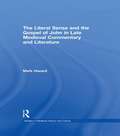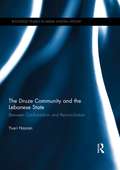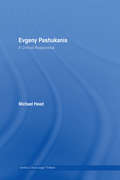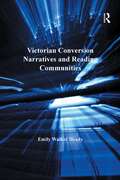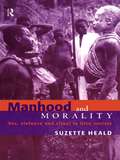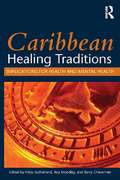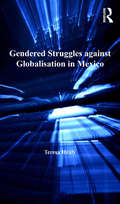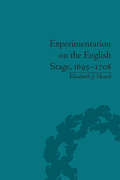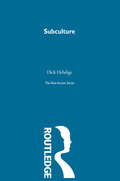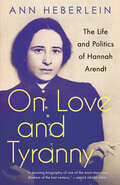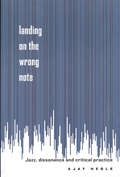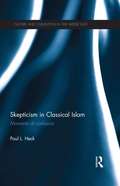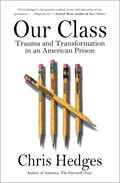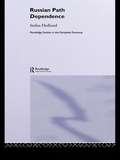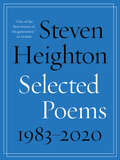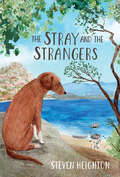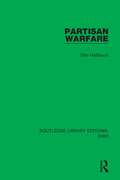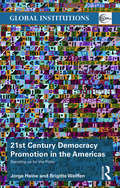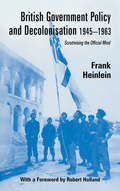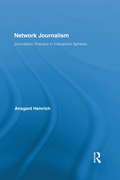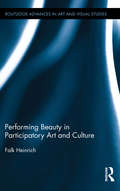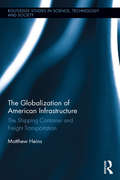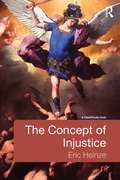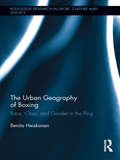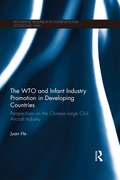Special Collections
Benetech’s Global Certified Accessible Titles
Description: Benetech’s GCA program is the first independent third-party EPUB certification to verify ebook accessibility. By creating content that is born accessible, publishers can meet the needs of all readers. Learn more: https://bornaccessible.benetech.org/
- Table View
- List View
The Literal Sense and the Gospel of John in Late Medieval Commentary and Literature
by MArk HazardFirst Published in 2003. Routledge is an imprint of Taylor & Francis, an informa company.
The Druze Community and the Lebanese State
by Yusri HazranOne of the fundamental questions of Middle Eastern, and Lebanese studies in particular, is the history of the relationship between the Druze community and the state in modern Lebanon. Arguing that the Druze community has been politically alienated from the Lebanese state, this book explores the historical and political origins of this alienation. The Druze Community and the Lebanese State contends that the origins of this alienation lie in the state’s national ideology, its political confessional system, and the Druze’s historical background during the medieval period. Moreover, this book examines the extent to which the Druze’s attitude vis-à-vis the Lebanese state has been influenced by their historical rivalry with the Maronites. Particular emphasis is placed on the political and ideological practices adopted by the Druze leadership and intelligentsia as they dealt with the changes taking place in their community’s political status following the political settlements of 1920 and 1943 (the establishment of Greater Lebanon and the National Pact, respectively). A welcome addition to existing literature on Lebanon, this book will be an essential reference tool for students and researchers with an interest in nationalism, identity and Middle East Politics more broadly.
Evgeny Pashukanis
by Michael HeadA thorough examination of Pashukanis’ writings, this book is a significant contribution to a proper assessment of Pashukanis’ work, the value of his theoretical legacy and the contemporary relevance of Marxist legal theory. Interest in the best-known Soviet legal scholar, Evgeny Pashukanis, remains widespread and his work retains considerable relevance. His writings provide a rich source of material on the Marxist theory of law and the state, as well as the attempts to apply that doctrine in Soviet Russia. In this book, Michael Head considers Pashukanis’ work both within its historical context and in relation to contemporary legal theory, answering a range of questions including: How and why did Pashukanis emerge as the pre-eminent Soviet jurist from 1924 to 1930? Why did he come under only minor criticism from 1930 to 1936 and then be denounced and executed in 1937 as a 'Trotskyite saboteur'? Why have many Western scholars generally praised the quality and originality of Pashukanis’ work, yet also drawn the conclusion that his fate illustrates the intrinsic impossibility of the entire communist project? Serving as an introduction to Pashukanis and Marxist legal theory and a timely contribution in light of the universal assault on civil liberties in the indefinite 'War on Terror' and the constant escalation of 'law and order' measures in Western societies, this volume is an invaluable resource for those interested in jurisprudence and critical thought.
Victorian Conversion Narratives and Reading Communities
by Emily Walker HeadyBecause Victorian authors rarely discuss conversion experiences separately from the modes in which they are narrated, Emily Walker Heady argues that the conversion narrative became, in effect, a form of literary criticism. Literary conventions, in turn, served the reciprocal function as a means of discussing the nature of what Heady calls the 'heart-change.' Heady reads canonical authors such as John Henry Newman, Charles Dickens, Charlotte Brontë, George Eliot, and Oscar Wilde through a dual lens of literary history and post-liberal theology. As Heady shows, these authors question the ability of realism to contain the emotionally freighted and often jarring plot lines that characterize conversion. In so doing, they explore the limits of narrative form while also shedding light on the ways in which conversion narratives address and often disrupt the reading communities in which they occur.
Manhood and Morality
by Suzette Heald'An impressive and meticulously crafted African ethnography, which has theoretical and practical relevance for understanding masculinity and violence in general'- David Parkin, Professor of Anthropology, Cambridge University Manhood and Morality explores issues of male identity among the Gisu of Uganda and the moral dilemma faced by men who define themselves by their capacity for violence. Drawing extensively on twenty years of fieldwork and on psychological theory the book covers: circumcisionOedipal feelingswitchcraftdeviancejokingsexualityand ethnicity.This ethnographic study challenges our preconceptions of manhood, especially African virility, inviting a wider re-evaluation of masculinity.
Caribbean Healing Traditions
by Implications For Health and Mental HealthAs Caribbean communities become more international, clinicians and scholars must develop new paradigms for understanding treatment preferences and perceptions of illness. Despite evidence supporting the need for culturally appropriate care and the integration of traditional healing practices into conventional health and mental health care systems, it is unclear how such integration would function since little is known about the therapeutic interventions of Caribbean healing traditions. Caribbean Healing Traditions: Implications for Health and Mental Health fills this gap. Drawing on the knowledge of prominent clinicians, scholars, and researchers of the Caribbean and the diaspora, these healing traditions are explored in the context of health and mental health for the first time, making Caribbean Healing Traditions an invaluable resource for students, researchers, faculty, and practitioners in the fields of nursing, counseling, psychotherapy, psychiatry, social work, youth and community development, and medicine.
Gendered Struggles against Globalisation in Mexico
by Teresa HealyTeresa Healy here examines resistance within Mexican society during a period of sustained crisis at the regional and national level, as well as at the level of world order. She analyzes how working class men organized to fight for the recognition of their citizenship rights, how they defended those rights when faced with repression and economic restructuring and how they contested the terms of globalization as it wrested from them their masculine identity of 'worker-fathers'. Healy also demonstrates how these men battled employers and masculinized political power at every level within the state to maintain their livelihoods and resist the feminization of their work and their own identities. These were gendered struggles against globalizations as they were experienced and carried out by men. The volume uncovers the limits and possibilities of working class men and women in transforming the conditions in which they live and work, and highlights the diversity and rich political history of social movements in Mexico.
Experimentation on the English Stage, 1695-1708
by Elisabeth J HeardAt the beginning of the eighteenth century, British theatre saw a shift from what critics call 'Restoration' to 'sentimental' comedy. Focusing on the career of the Irish dramatist George Farquhar (1678-1707), this book argues that experimentation was the basis for this change.
Subculture
by Dick HebdigeFirst Published in 2002. Routledge is an imprint of Taylor & Francis, an informa company.
On Love and Tyranny
by Dr. Ann HeberleinIn an utterly unique approach to biography, On Love and Tyranny traces the life and work of the iconic German Jewish intellectual Hannah Arendt, whose political philosophy and understandings of evil, totalitarianism, love, and exile prove essential amid the rise of the refugee crisis and authoritarian regimes around the world. What can we learn from the iconic political thinker Hannah Arendt? Well, the short answer may be: to love the world so much that we think change is possible.The life of Hannah Arendt spans a crucial chapter in the history of the Western world, a period that witnessed the rise of the Nazi regime and the crises of the Cold War, a time when our ideas about humanity and its value, its guilt and responsibility, were formulated. Arendt’s thinking is intimately entwined with her life and the concrete experiences she drew from her encounters with evil, but also from love, exile, statelessness, and longing. This strikingly original work moves from political themes that wholly consume us today, such as the ways in which democracies can so easily become totalitarian states; to the deeply personal, in intimate recollections of Arendt’s famous lovers and friends, including Heidegger, Benjamin, de Beauvoir, and Sartre; and to wider moral deconstructions of what it means to be human and what it means to be humane.On Love and Tyranny brings to life a Hannah Arendt for our days, a timeless intellectual whose investigations into the nature of evil and of love are eerily and urgently relevant half a century later.
Landing on the Wrong Note
by Ajay HebleAn imaginative and passionate synthesis of form and function, Landing on the Wrong NOte goes beyond mainstream jazz criticism, outlining a new poetics of jazz that emerges not from the ivory tower but from the clubs, performances, and lives of today's jazz musicians.
Skepticism in Classical Islam
by Paul L. HeckThe first major treatment of skepticism in Islam, this book explores the critical role of skeptical thinking in the development of theology in Islam. It examines the way key thinkers in classical Islam faced perplexing questions about the nature of God and his relation to the world, all the while walking a fine line between belief in God’s message as revealed in the Qur’an, and the power of the mind to discover truths on its own. Skepticism in Classical Islam reveals how doubt was actually an integral part of scholarly life at this time. Skepticism is by no means synonymous with atheism. It is, rather, the admission that one cannot convincingly demonstrate a truth claim with certainty, and Islam’s scholars, like their counterparts elsewhere, acknowledged such impasses, only to be inspired to find new ways to resolve the conundrums they faced. Whilst their conundrums were unique, their admission of the limits of knowledge shares much with other scholarly traditions. Seeking to put Islam on the map of the broader study of the history of scepticism, this book will be of interest to scholars and students of Religion, History and Philosophy.
Our Class
by Chris HedgesA powerfully moving book that &“could make graspable why today&’s prisons are contemporary slave plantations&” (Alice Walker, author of The Color Purple), giving voice to the poorest among us and laying bare the cruelty of a penal system that too often defines their lives.Pulitzer Prize–winning journalist Chris Hedges has taught courses in drama, literature, philosophy, and history since 2013 in the college degree program offered by Rutgers University at East Jersey State Prison and other New Jersey prisons. In his first class at East Jersey State Prison, where students read and discussed plays by Amiri Baraka and August Wilson, among others, his class set out to write a play of their own. In writing the play, Caged, which would run for a month in 2018 to sold-out audiences at The Passage Theatre in Trenton, New Jersey, and later be published, students gave words to the grief and suffering they and their families have endured, as well as to their hopes and dreams. The class&’s artistic and personal discovery, as well as transformation, is chronicled in heartbreaking detail in Our Class. This &“magnificent&” (Cornel West, author of Race Matters) book gives a human face and a voice to those our society too often demonizes and abandons. It exposes the terrible crucible and injustice of America&’s penal system and the struggle by those trapped within its embrace to live lives of dignity, meaning, and purpose.
Russian Path Dependence
by Stefan HedlundRussia's transition to a market economy has been tortuous to say the least. However, this book argues that the arguments and counter-arguments that pitch shock therapy against gradualism are wide of the mark and quite pointless.Indeed, the reasons for the warped outcomes can actually be traced back through the long sweep of Russian history. Decisions made in the distant past can fully influence policy- making in the present. Hedlund's thesis can, like this, be seen as influenced by the 'path dependency' theories of Paul David among others.
Selected Poems 1983–2020
by Steven HeightonThis collection of new and previously published poems by Steven Heighton, author of the Governor General’s Literary Award winner The Waking Comes Late, showcases a defining lyric poet of his generation.Selected Poems 1983–2020 is Steven Heighton’s seventh volume of poetry and the first since his Governor General’s Literary Award–winning collection, The Waking Comes Late. Incorporating a grouping of previously unpublished poetry and a selection of key poems from his six previous acclaimed collections, this timely volume showcases a generational talent whose work has been described by critics as “exhilarating,” “genuine,” and “arrestingly beautiful.”Heighton’s debut collection, Stalin’s Carnival,won the Gerald Lampert Award for Best First Book of Poetry in 1990. Subsequent books, which include bestselling novels, essays, and critical writings, confirmed Heighton as an exciting and important voice in Canadian letters. Heighton’s poetry is recognised for its technical skill and musicality, its erudition, and its empathy and unvarnished emotion.
The Stray and the Strangers
by Steven HeightonBased on a true story, a stray dog befriends an orphan boy in a refugee camp on a Greek island. The fishermen on Lesvos call her Kanella because of her cinnamon color. She’s a scrawny, nervous stray — easily intimidated by the harbor cats and the other dogs that compete for handouts on the pier. One spring day a dinghy filled with weary, desperate strangers comes to shore. Other boats follow, laden with refugees who are homeless and hungry. Kanella knows what that is like, and she follows them as they are taken to a makeshift refugee camp. There she comes to trust a bearded man, an aid worker, and gradually settles into a contented routine. Kanella grows healthy and confident. She has a job now — to keep watch over the people in her camp. One day, a little boy arrives and does not leave like the others. He seems to have no family and, like Kanella, he is taken in by the workers. He sleeps on a cot in the food hut, and Kanella keeps him warm and calm. When two new adults come to the camp. Kanella is ready to defend the boy from them, until she is pulled away by the bearded man. They are the boy’s parents, and now he must go with them. Eventually, the camp is dismantled, and Kanella finds herself homeless again. Until one night, huddled in the cold, she awakens to see two bright lights shining in her eyes — the headlights of a car. The bearded man has come back for her, and soon Kanella is on a journey, too, to a new home of her own. Key Text Features maps illustrations author's note Correlates to the Common Core State Standards in English Language Arts: CCSS.ELA-LITERACY.RL.5.6 Describe how a narrator's or speaker's point of view influences how events are described.
Partisan Warfare
by Otto HeilbrunnThis book, first published in 1962, was the first systematic study of partisan war, investigating questions thrown up by the success of guerrillas in the Second World War, where they were never decisively beaten by regular armies. Drawing on lessons from Soviet Russia and China in particular, areas with especially active and large partisan forces, this book evolves a doctrine of guerrilla war in modern conditions, with an analysis of partisans in post-war Malaya, Kenya, Cyprus, Vietnam, Algeria, Cuba and Laos.
21st Century Democracy Promotion in the Americas
by Jorge Heine and Brigitte WeiffenThis volume examines the promotion and defense of democracy in the Americas. Taking the Inter-American Democratic Charter (IADC) of 2001 as a baseline, it charts the evolution of the issue over the past decade. Although it considers historical antecedents, the main focus of the book is on key instances of promotion and defense of democracy in the Western hemisphere since the adoption of the IADC. It analyzes democratic norms, norm enforcement mechanisms and how they work in practice. Special attention is paid to the 2009 Honduras coup, the issues raised by it and the debates that surrounded it, as this was the first instance in which a member state was suspended in accordance with the IADC. Three central themes guide the analysis: the nature of challenges to democracy in Latin America; the role of regional organizations as democracy promoters; and the transformation of Inter-American relations. The book unveils the key achievements and limitations of the OAS in the field and will be of great interest to students and scholars of democratization, US-Latin American relations, international relations of Latin-America and international organizations.
British Government Policy and Decolonisation, 1945-63
by Frank HeinleinThis book is an in-depth study of the importnace of the Empire-Commonwealth in the two decades after WWII for Britain's self-image as a great power. By studying a wide range of debates on general and specific imperial problems, the book highlights the "official mind" of decolonization - and of late imperialism.
Network Journalism
by Ansgard HeinrichDrawing on current theoretical debates in journalism studies, and grounded in empirical research, Heinrich here analyzes the interplay between journalistic practice and processes of globalization and digitalization. She argues that a new kind of journalism is emerging, characterized by an increasingly global flow of news as well as a growing number of news deliverers. Within this transformed news sphere the roles of journalistic outlets change. They become nodes, arranged in a dense net of information gatherers, producers, and disseminators. The interactive connections among these news providers constitute what Heinrich calls the sphere of "network journalism."
Performing Beauty in Participatory Art and Culture
by Falk HeinrichThis book investigates the notion of beauty in participatory art, an interdisciplinary form that necessitates the audience’s agential participation and that is often seen in interactive art and technology-driven media installations. After considering established theories of beauty, for example, Plato, Alison, Hume, Kant, Gadamer and Santayana through to McMahon and Sartwell, Heinrich argues that the experience of beauty in participatory art demands a revised notion of beauty; a conception that accounts for the performative and ludic turn within various art forms and which is, in a broader sense, a notion of beauty suited to a participatory and technology-saturated culture. Through case studies of participatory art, he provides an art-theoretical approach to the concept of performative beauty; an approach that is then applied to the wider context of media and design artefacts.
The Globalization of American Infrastructure
by Matthew HeinsThis book gives an account of how the U.S. freight transportation system has been impacted and “globalized,” since the 1950s, by the presence of the shipping container. A globally standardized object, the container carries cargo moving in international trade, and it utilizes and fits within the existing transportation infrastructures of shipping, trucking and railroads. In this way it binds them together into a nearly seamless worldwide logistics network. This process occurs not only in ocean shipping and at ports, but also deep within national territories. In its dependence on existing infrastructural systems, though, the network of container movement as it pervades domestic space is shaped by the history and geography of the nation-state. This global network is not invariably imposed in a top-down manner—to a large degree, it is cobbled together out of national, regional and local systems. Heins describes this in the American context, examining the freight transportation infrastructures of railroads, trucking and inland waterways, and also the terminals where containers are transferred between train and truck. The book provides a detailed historical narrative, and is also theoretically informed by the contemporary literature on infrastructure and globalization.
The Concept of Injustice
by Eric HeinzeThe Concept of Injustice challenges traditional Western justice theory. Thinkers from Plato and Aristotle through to Kant, Hegel, Marx and Rawls have subordinated the idea of injustice to the idea of justice. Misled by the word’s etymology, political theorists have assumed injustice to be the sheer, logical opposite of justice. Heinze summons ancient and early modern texts, philosophical and literary, with special attention to Shakespeare, to argue that injustice is not primarily the negation, failure or absence of justice. It is the constant product of regimes and norms of justice. Justice is not always the cure for injustice, and is often its cause.
The Urban Geography of Boxing
by Benita HeiskanenThis book is an interdisciplinary cultural examination of twenty-first century boxing as a professional sport, a bodily labor, a lucrative business, a popular entertainment, and an instrument of ideology. Based on ethnographic fieldwork and interviews conducted with Latino boxers, women boxers, and boxing insiders in Texas, it discusses boxing from the vantage point of the sundry players, who are involved with it: the labor force, promoters, handlers, ringside officials, medical professionals, media, and the audiences. The various parties have multiple stakes in the sport. For some, boxing is about physical empowerment; others are in it for the money; some deploy it for ideological purposes; yet others use it to claim their 15-minutes of fame, and frequently the various interests overlap. In this book, Benita Heiskanen makes a broader connection between boxing and the spatial organization of racialized, class-based, and gendered bodies within particular urban geographies. Journeying actual sites where the sport is organized, such as the barrio, boxing gym, and competition venues, she maps the ways in which boxing insiders negotiate a variety of conflicting agendas at local, regional, and national scales. Beyond the United States, the worker-athletes conduct their labor within global socioeconomic conditions, business networks, and legal principles. Through this sporting context, Heiskanen’s discussion discloses some complex socio-historical, cultural, and political power relations between urban margins and centers, with ramifications far beyond boxing. This book will be of interest to readers in Sport Studies, Cultural Studies, Cultural Geography, Gender Studies, Critical Race Theory, Labor Studies, and American Studies.
The WTO and Infant Industry Promotion in Developing Countries
by Juan HeThe charter of the World Trade Organization (WTO) sets the tone that sustainable trade and economic development dominates multilateral trade negotiation and specific working agreements. This book examines the novel challenge for developing countries to upgrade and optimize their industrial structure and trade composition by stimulating genuinely innovative and competitive industrial strength. The book specifically explores the issue of infant industry promotion under the legal framework of the WTO treaties and case law. Taking the regulatory measures and incentives China has used to build up a large civil aircraft supplier, the book evaluates the key trade agreements relevant to infant industry promotional policies and practices, such as product regulations and standards under the 'Agreement on Technical Barriers to Trade', and export promotion policies under the 'Agreement on Subsidies and Countervailing Measures'. Juan He argues that the regulatory room prescribed by the multilateral trade rules of the WTO does not allow adequate space for developing countries to encourage new and technologically advanced areas of production and trade. The author concludes by suggesting ways in which WTO rules could be modified to help enable developing countries’ industrialization. In doing so, the book highlights a need to investigate how localized and international policy trends can be reconciled and enhanced towards the common goal of development. The book will be of great interest to scholars and students of international trade law, Chinese studies, international political economy, and of great use to government agencies responsible for internal trade and industrial policy decisions.
